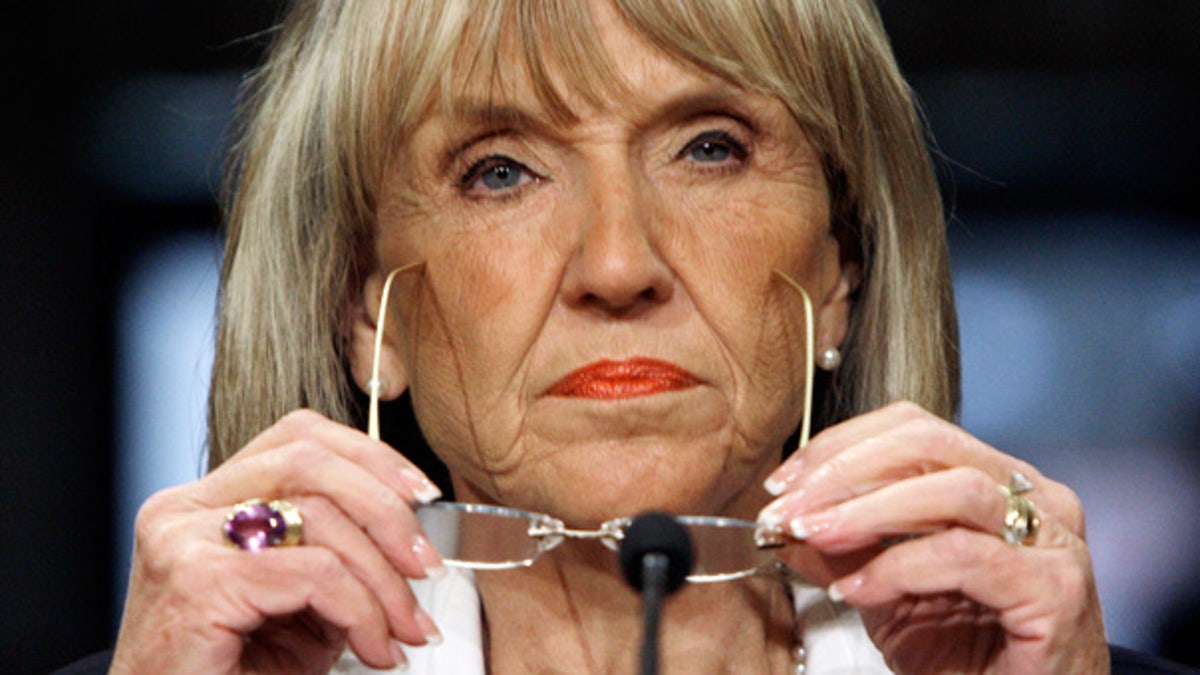
Arizona Gov. Jan Brewer listens during a meeting on violence along the U.S.-Mexico border, in Phoenix. (AP FILE)
Arizona urged a federal judge Tuesday to reject the Obama administration's challenge to its tough new immigration law, arguing the border state is acting within its powers.
Gov. Jan Brewer said President Obama is trying to prevent Arizona from protecting its citizens with the Justice Department suit, one of seven seeking to have the new law blocked before it goes into effect July 29.
The Tuesday filing said illegal immigration and a lack of comprehensive enforcement by the federal government has caused "crushing personal, environmental, criminal, and financial burdens" on Arizona.
"Arizona merely seeks to assist with the enforcement of existing federal immigration laws in a constitutional manner," lawyers for Brewer said. "It is [the Obama administration] that is attempting to impose immigration policies and priorities that contravene and conflict with federal law and unambiguous congressional intent."
The law requires officers, while enforcing other laws, to check a person's immigration status if there's reasonable suspicion that the person is here illegally.
In a statement, Brewer said she was "confident that the court will reject President Obama's attempt to prevent our state from protecting its citizens as a result of his failure to enforce federal immigration laws."
"My filing today makes clear that the federal government will suffer no harm if [the law] is implemented because the act requires only that Arizona's law enforcement officers act in accordance with their constitutional authority and congressionally established federal policy," she said.
U.S. District Judge Susan Bolton will hear oral arguments on Thursday and could issue a preliminary injunction if she finds that ultimately the Obama administration would succeed in its quest to have the law struck down.
The stakes are incredibly high. If Bolton rules in Arizona's favor, it opens the door to states taking on issues that have long been the responsibility of the federal government.
Bolton has ruled in two cases unrelated to immigration that federal law trumps state law.
In 2008, Bolton threw out a claim by a woman who alleged her employer broke a federal law on overtime pay. The woman made the claim under federal law but sought more generous damages under a state law dictating when an employee is to be paid. The judge threw out her claim under state law.
Three years earlier, in a lawsuit from a woman who claimed she was harmed by taking a cold medicine, Bolton ruled that a state law immunizing drug makers from most punitive damages in product liability cases was superseded by federal law.
Bolton has declined to be interviewed by The Associated Press about the Arizona law.
Bolton was born in 1951 and raised in Philadelphia, earned her undergraduate and law degrees from the University of Iowa and clerked for a state appeals court judge in Arizona. During her 11 years as an attorney in private practice, she co-authored a book that provides legal and clinical perspectives on violence in families.
She was appointed to the state bench in 1989 by Democratic Gov. Rose Mofford. When she was considered for a state Supreme Court post several years later, she was listed as an Independent. Her current voter registration records have been sealed.
Many lawyers who pressed cases in her court praised Bolton's meticulous reading of their filings. She asks tough questions, they said, and can handle the mountain of paper that's coming from the seven challenges to the law.
"I always felt like I got a fair shake out of her, even if she didn't rule my way," said Ed Novak, the former president of the State Bar of Arizona.
But Bolton's decisions haven't always been popular. In 2000, she struck from the ballot a land-preservation proposal advanced by the Arizona Legislature. The measure was a bid to counter a similar proposal by environmentalists that remained on the ballot.
Bolton said the Legislature's proposal violated a state constitutional requirement that ballot measures cannot cover more than one subject.
Critics called Bolton an activist judge, and accused her of working with the environmentalists to torpedo the Legislature's option.
"It seemed to me that it was more of a political decision than a decision based on fact," said Rusty Bowers, then the Senate majority leader.
Bolton's decision was reversed by the Arizona Supreme Court, and the measure appeared on the ballot and was defeated.
Paul Charlton, Arizona's top federal prosecutor from 2001 to 2007, said the criticism was unfair.
"It would be a mistake to put any kind of label on her," Charlton said. "This is someone who is not concerned with external political issues."
In any case, the lawyers in her courtroom shouldn't count on Bolton cutting them slack.
When government attorneys asked earlier this month for a last-minute hearing on whether to block Arizona's immigration law, Bolton called it laughable.
Under their timetable, Bolton would've had just 60 hours before the law took effect to decide whether to block it.
"That is completely unrealistic," Bolton said, instead setting the hearing for this week.
The Associated Press contributed to this report.

